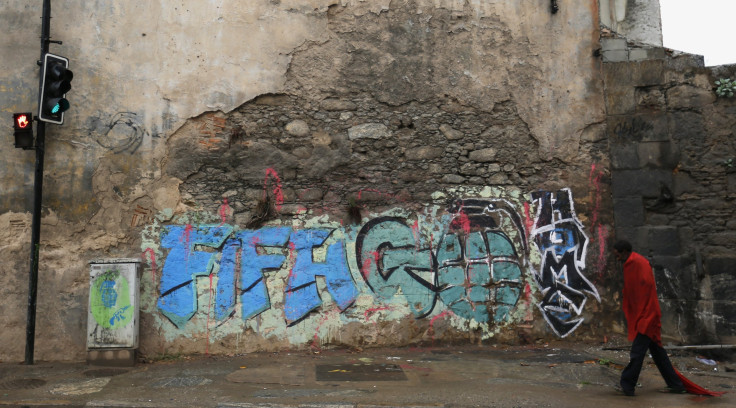Does Winning The World Cup Boost Markets? Goldman Sachs Thinks So

If Wall Street investment is like a high-stakes game, is the converse true? That is the question behind a quadrennial Goldman Sachs exercise that analyzes the World Cup as if it were an investment opportunity.
When the four-week tournament kicks off in Brazil on June 12, hundreds of millions of avid fans will follow it obsessively.
And just as players are always looking for an edge, bettors -- including the Wall Street variety -- will also be searching for that little extra insight that they can use to their advantage.
So, which team is likely to pay dividends?
Every four years, Goldman Sachs experts analyze vast amounts of historical data and statistics to make predictions about the World Cup, then use the data to poll thousands of clients and create a dream team.
“We could only wish for this level of dedication from our team around the world to their regular tasks,” the authors of this year’s analysis wrote in the introduction.
Using data going back to 1960, and analyzing factors such as team rankings, number of goals scored and where the tournament was held, they predict that Brazil will win the final match. (Key factors: the team's record and its home field advantage.)
But they took their predictions beyond the field and into the market.
“There is no doubt that the World Cup captures huge attention and with it, generates a massive amount of passion. But does it have any impact on stock markets?” the analysts asked.
The Goldman Sachs report, “The World Cup and Economics 2014,” posits that a World Cup victory boosts a country’s market for months after the event, while the runner-up experiences a slump.
“There is a clear pattern of outperformance by the winning team in the weeks after the World Cup final,” the authors wrote, citing an average advantage of 3.5 percent over global equity markets.
For example, just a month after Brazil's win in 1994, when the World Cup was played in the U.S., the Brazilian market outperformed the MSCI World Index by 21 percent, jumping to 38 percent three months later. Meanwhile, seven out of nine runners-up saw their stock markets underperform following the World Cup, falling on average of 5.6 percent over three months.
Some analysts aren’t so optimistic. Dario Perkins, of Lombard Street Research, warned that it’s not just the soccer fans who will be biting their nails next month.
“For many, the soccer World Cup is a time of anxiousness and suffering, followed by chaotic collapse. England fans have come to expect this but … the pain doesn’t always stop there,” he wrote in a note.
The first World Cup in 1930 coincided with the start of the Great Depression. In 1990 the U.S. was in recession. Four years later global bond markets were in turmoil, and in 1998 Russia defaulted on its debt and the world’s biggest hedge fund collapsed.
“The coincidences got me thinking. What could go wrong this time?” Perkins wrote, citing the downfall of Japan’s Abenomics, a currency war between the U.S. and EU, and unknown fallout from the Ukraine-Russia crisis as possibilities.
“Like the England soccer team’s defense, the global financial system might be more fragile than we like to believe,” he added.
Betting on the correlation between stock prices and sports events probably isn't the best financial strategy. But it isn't completely without merit.
A World Cup Win can boost the population’s mood, which can have a small effect on markets. In 2010, Germany’s strong run had analysts predicting an uptick in consumer demand, and boost to the economy.
“It is plausible that sporting success can provide a temporary boost to stock markets,” said Julian Jessop, chief global economist at Capital Economics, citing rising consumer confidence as one of the major factors. But the bump shouldn’t last long.
“Whether there is any lasting boost to actual activity and profits is debatable, and the potential uplift to equity prices is small and could easily be offset by other factors,” he said.
Indeed, the 3.5 percent boost Goldman Sachs analysts saw isn’t enough to be statistically significant, according to sports economics expert Victor Matheson, a professor at the College of the Holy Cross in Worcester, Massachusetts.
“It looks like that’s just an artifact of pure luck. There is certainly no good economic or statistical evidence that winning the World Cup does a whole lot for your economy,” he said.
“If you look at any sort of event over time and average things out, about half the time the stock market will be up, and half the time it’ll be down,” he added.
Of course, specific industries do well during these events. Brazil has spent $13 billion on infrastructure, which is a boon for construction companies, for example. Hotels in host cities are also likely to see a major benefit.
But hosting the event is a double-edged sword.
“I wouldn’t be putting all my money into the Brazilian stock market right now,” Matheson said, adding that it might be an especially risky move considering the debt they’ll have to pay after hosting the 2014 World Cup and 2016 Olympics.
“The only thing you can predict is that it’s going to be a real headache for Brazil to pay back all their debts,” he said.
The country has spent $3.6 billion building stadiums alone, more than the money spent in the past two World Cups put together, as work on other infrastructure projects such as airports, roads and other projects stagnate amid bureaucratic problems, according to The Wall Street Journal.
“You can probably make more money betting on Goldman’s sports predictions than in the Brazilian markets,” Matheson said.
© Copyright IBTimes 2025. All rights reserved.





















